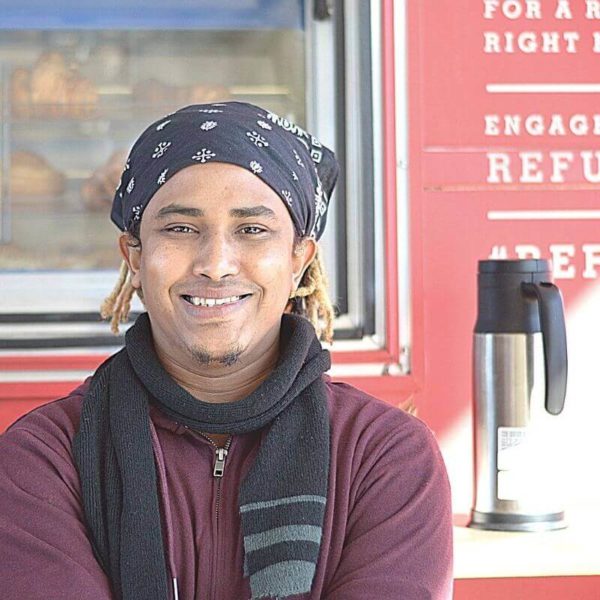We all have an inherent need to feel like we belong—to feel loved, seen, cared for, and appreciated. But each of these feelings is also an action: we can love, see, care, and appreciate. And in so doing, we not only nourish another person’s sense of belonging, but our own as well.
This is the process of welcoming. And despite its challenges, it’s always a privilege. Whether through a simple smile, a warm meal, or a kind word or gesture, the act of welcoming refugees, asylum-seekers, and immigrants brings us into an important chapter of their new story—and them into ours.
The people and organizations we’re featuring this month are experts in welcoming others. Their examples are not only inspiring, but a valuable source of guidance:
Read on to learn more. And after you do, you’re welcome to forward this newsletter to your friends and encourage them to subscribe.
A Flavorful Welcome
One of the most natural ways to help a person feel welcome in a new environment is to offer something familiar. And few things are more relatable than the foods we know and love.
However, after resettling in the US, many refugees find it challenging to cook their traditional meals. Why? The International Institute of St. Louis (IISTL) recognized one practical reason—and took action.
While food banks, food drives, and other aid resources have long provided refugees and immigrants with important non-perishable foods like pasta, rice, and beans, something essential is often missing. And that something is surprisingly important to providing a meaningful welcome.
Spices—the ingredients that infuse traditional meals with much of their flavor, uniqueness, heat, and familiarity—often slip under the radar in food-aid programs. To address this need, IISTL joined local grocer Global Foods Market to host their 2nd annual spice drive.
The process is simple:
- Collect donations of spices from residents and businesses
- Distribute these important ingredients to refugee families
This program is a great example of the fact that welcoming others doesn’t need to be complicated. Often, it’s simply a matter of showing up, seeing a need, and deciding to begin.
Shayn Prapaisilp, chief operating officer of Global Foods Group, described the importance of this process beautifully when he discussed welcoming Afghan refugees in an article for Civil Eats:
“Yes, they were going to be fed when they got over here…But if you’re eating food that you’re not familiar with, or you’re not sure what it is, it’s less nourishing in a way. We were able to provide a taste of Afghanistan. And we hoped that it made the transition a little bit easier.”
Refuge Coffee
For refugees starting life in a brand new place and culture, a sense of welcome is not only a matter of feeling emotional connection, but also of receiving practical support—including the very important support of finding work.
The team behind Refuge Coffee recognized that in order to feel connected and capable—and in order to provide for their needs—refugees required a safe, welcoming place to work.
From this awareness, their mission was born: to provide meaningful employment and job training to refugees resettled in the United States. Today, Refuge Coffee aims to empower refugees by creating a safe and supportive workplace where they can learn new skills, gain confidence, and earn a living wage.

In addition, Refuge Coffee strives to raise awareness and promote understanding of refugee issues through storytelling and community outreach.
Since its debut in 2014, Refuge Coffee has played a significant role in their stories of growth, independence, freedom, and new beginnings.
Foods of Welcome
We can all relate to the feeling of nostalgia a familiar meal can bring. Food is a tool of welcome around the world, and it’s fascinating and inspiring to learn the many epicurean traditions that different cultures use to communicate a warm welcome.
For example, in India, it’s customary to bring vegetarian treats when visiting someone’s home for the first time. And fruits like apples, bananas, grapes, and oranges are often presented as housewarming gifts.
In France, one way to welcome new friends to the neighborhood is to invite them over for l’apéritif or l’apéro—a late-afternoon snack of cheese and cured sausages.
The tradition of bringing bread and salt as a welcome started in Russia, but it has spread across the globe as a symbol of hospitality. The bread is meant to ensure that new friends never go hungry, and the salt represents a life full of flavor. In fact, astronauts have even brought bread and salt to the International Space Station, to celebrate their new home in the stars!
Food is a universal need, and a universal symbol of hospitality. Inspire your next welcome effort with great ideas from this HuffPost article:
Spread the Word
Know someone who would be interested in Appetite for Humanity or the causes we feature? Please share a link to this post or encourage them to subscribe.